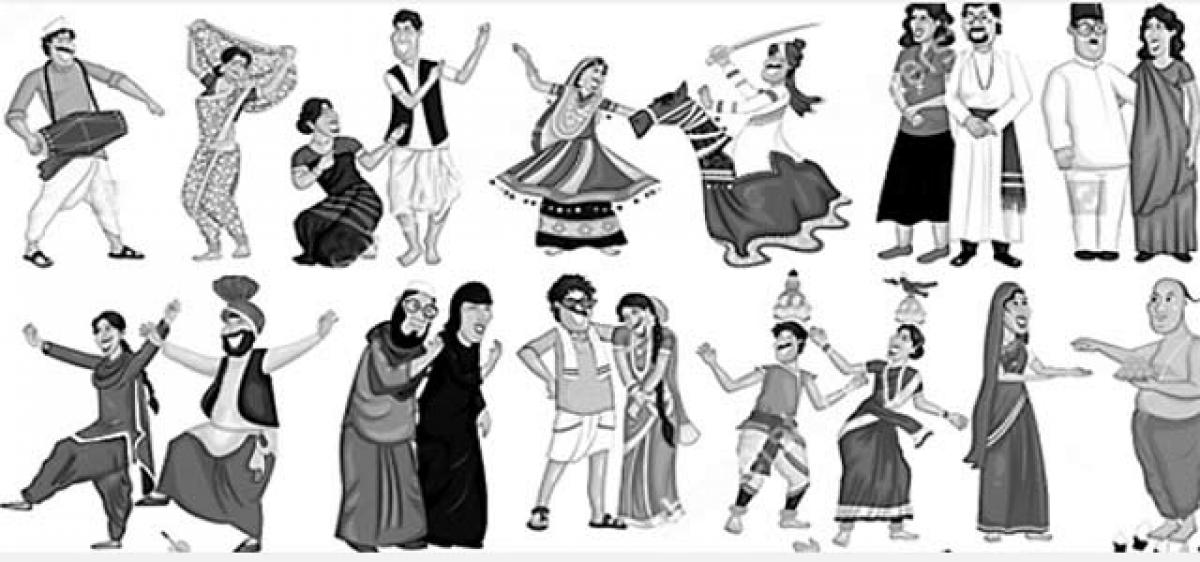Live
- BJP MP candidate Bharat Prasad visited the student who tried to commit suicide
- PM’s popularity in the fast lane: Autos with 'Har Dil Mein Modi' slogan spotted across Delhi
- Delhi-based political parties are like East India Company: Sukhbir Badal
- Golf: Diksha moves into Top-20 at South African Women’s Open
- KCR lashes out against BJP and Congress for destroying Telangana
- Dairy Science students visited the Milk cooling plant
- Moody feels Pant ahead in keepers’ race for T20 WC squad; Srikkanth picks Rahul over Samson as reserve keeper
- Thanking voters for extending 'unparalleled support' to NDA, PM Modi says second phase 'too good'
- Natural Relief for Menstrual Cramps: Beetroot Juice Recipe
- Asha Worker died in a road accident
Just In

When the British power was established in India it was highly centralised and unitary. To hold India under its imperial authority, the British had to control it from the centre and ensure that power remained centralised in their hands.
When the British power was established in India it was highly centralised and unitary. To hold India under its imperial authority, the British had to control it from the centre and ensure that power remained centralised in their hands.
A strong central authority was for the British both an imperial and an administrative necessity. The country continued to be ruled under the 1919 Act by a central authority until 1947.
And, since under the 1919 Act, there was a central government, a central legislature, a system of central laws etc., the use of these terms continued under the colonial hangover.
In the Constituent Assembly, the Drafting Committee decided in favor of describing India as a Union, although its Constitution might be federal in structure.
Moving the Draft Constitution for the consideration of the Constituent Assembly on 4 November 1948, Ambedkar explained the significance of the use of the expression "Union" instead of the expression "Federation".
He said "…what is important is that the use of the word 'Union' is deliberate… Though the country and the people may be divided into different States for convenience of administration, the country is one integral whole, its people a single people living under a single imperium derived from a single source."
Finally, when the Constitution was adopted on 26 November 1949, it provided for India being a Union of States and its States and territories being as specified in the First Schedule. The Schedule specified four types of units - Parts 'A', 'B' and 'C' States and Part 'D' territories.
During the last half-a-century, many structural changes have been made and the map of the Union of States reshaped. Categorisation of States has disappeared, names of several territorial units called States have vanished, and many new States have been formed.
As at present, the Union consists of 28 States and seven Union Territories. Some unique solutions of regional councils, development boards, etc., have been attempted with varying degrees of success. The four newest States are Uttaranchal, Jharkhand, Chhattisgarh and Telangana.
The predominant concern of the founding fathers as also of the various Commissions and Committees appointed since Independence to consider reorganisation of States or Union-State Relations - the JVP Committee, the Dar Commission, the States Reorganisation Commission (SRC), the Rajamannar Committee, the Sarkaria Commission, etc. - has been that of the unity and integrity of India.
We are still engaged in the stupendous task of national integration which is also an admission of the hard reality of our nation and Union being still in the making.
The SRC report concluded that it is the Union of India which is the basis of our nationality…States are but limbs of the Union, and while we recognize that the limbs must be healthy and strong…it is the strength and stability of the Union and its capacity to develop and evolve that should be governing consideration of all changes in the country.
The Commission feels that there is no dichotomy between a strong Union and strong States. Both are needed. The relationship between the Union and the States is a relationship between the whole body and its parts.
For the body being healthy it is necessary that its parts are strong. It is felt that the real source of many of our problems is the tendency of centralisation of powers and misuse of authority.
The basic Functions of Union and States are
A. Legislation
B. Finance
C. Trade, Commerce and
Intercourse
D. Resolution of Disputes
E. Executive
A. Legislation
- Legislative Relations
- Suggestion for a new entry in the Concurrent List – Management of Disasters and Emergencies, Natural or Man-made
B. Finance
- Financial Relations
- Enlargement of the Scope of the Finance Commission
- Share of States in taxes, cesses and surcharges.
- Tax on Services
- Status of Central Bank
C. Trade, Commerce and Intercourse
- Barriers to Inter-State Trade and Commerce
- Trade and Commerce Commission
D. Resolution of Disputes
- Inter-State Disputes
- Inter-State Water Disputes
- Inter-State Water Disputes Act
- Inter-State Council
- Treaty Making
E. Executive
- Office of Governor
- Assent of the President and Governors
- Failure of Constitutional Machinery
- Use-misuse of article 356
- Sarkaria Commission
- Should Article 356 be deleted?
- Need for Conventions
- Situation of Political breakdown
- Constitutional Amendments
- Dissolution of Assembly
- Miscellaneous Matters

© 2024 Hyderabad Media House Limited/The Hans India. All rights reserved. Powered by hocalwire.com







